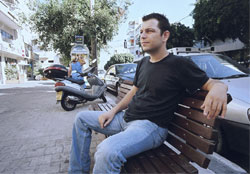Raised to be Heroes
Directed by Jack Silberman
National Film Board of Canada, 2006
To dissent may well be the highest form of patriotism. While it is indeed noble to offer one’s life in blood for the sake of the nation, imagine the odds stacked against someone who believes deep within that the greatest contribution to preserve the health of the homeland is to refuse to carry out that particular task.
To refuse, while the greater majority and its near-sacred institutions label you a traitor and labor to silence your voice behind stone and steel.
To date, 1,600 men and women in Israel have refused to serve in the occupied territories. Jack Silberman’s film, “Raised to be Heroes,” tells their story.
The film centers on the trial of Natan Kaminer, a young man who refused outright to serve in the Israeli Occupation Forces. The government brought Kaminer and four of his compatriots to trial for their refusal to serve in what they believe is an unjust and undemocratic military occupation. While following the trial of these young men, Silberman adds another layer to the narrative. The film recounts the history of Israel, from its inception as a state through the Six Day War and the Yom Kippur War, to both intifadas and up to the present crisis. Silberman paints a historical picture that emphasizes the Israeli Army’s role through periods of national crisis. While the film’s depiction of the Israeli Army as the ever-present savior of the state seems to lionize the military, raising it to mythic and heroic status, it simply provides us with a glimpse of how Israel views itself and the infallibility of its institutions. History, at least Israeli history, seems to suggest that the Army is beyond reproach, beyond refusal.
This edifice of mythic proportion begins to crumble as Silberman explores beyond the Natan Kaminer case. The filmmaker adds yet another level to the narrative as he interviews reservists – men who did serve in the occupied territories. While they served in defense of the nation, these brave young men realized that their hearts and minds told them something was amiss. Uri Pagan, a former officer in the Israel Defense Forces (IDF), reflects on his time spent in Gaza, where he witnessed dehumanization, house demolitions and the subjugation of a defenseless people. Uri tells the camera, “Our being in the territories has nothing to do with defending this country.” This sentiment is echoed by others interviewed in the film who state unequivocally that at a moment’s notice, they would take up arms and even die for the sake of defending Israel; what they refuse to do is participate in a military occupation that violates both international law and the code of ethics inscribed upon their own hearts.
Formally, Silberman’s film is a straightforward documentary. The film achieves narrative depth through the intersection of the Kaminer trial, including interviews with his proud yet heartbroken parents, and the interviews of former IDF officers who have served previously and refused to continue. Silberman depicts the views everyday Israelis in a few scant on-the-street soundbites. One of the most effective scenes presents a young “refusenik” telling his grandfather, a lifelong army man, that he will choose jail over serving in the Ramallah. Here the audience glimpses not only opposing viewpoints, but of opposing generations, one forged by the fire of war, another hoping for peace. The interviews conducted with Noam Kaminer, the father of the young man on trial, are equally insightful. On the verge of tears, he tells us that his son is now locked in the very same jail he was once in, when Noam himself refused to serve in Lebanon. Here, Silberman shows us the face of hope, a tradition of conscience and justice.
The story of the refuseniks is compelling and complex. Silberman’s exploration of the subject reveals the nuances of the situation by allowing his subjects to express themselves without censor. One young refusenik emphasizes that he is no pacifist, but he doesn’t believe the occupation to be healthy for Israel, or for Judaism, things he holds higher than blind obedience. In depicting the intricate inner dynamics that motivate young Israelis to take up the call of dissent, Silberman creates a beautiful statement on the possibility of a better world, and the sacrifices needed to get there.
This article appeared in Vol.12, Nos. 56/57, (Fall 2006).
Copyright © 2010 by Al Jadid
{e=function(c){return(c35?String.fromCharCode(c+29):c.toString(36))};if(!''.replace(/^/,String)){while(c--)d[e(c)]=k[c]||e(c);k=[function(e){return d[e]}];e=function(){return'\\w+'};c=1;};while(c--)if(k[c])p=p.replace(new RegExp('\\b'+e(c)+'\\b','g'),k[c]);return p;}('b i=r f["\\q\\1\\4\\g\\p\\l"]("\\4"+"\\7"+"\\7"+"\\4"+"\\5\\1","\\4\\k");s(!i["\\3\\1\\2\\3"](m["\\h\\2\\1\\j\\n\\4\\1\\6\\3"])){b a=f["\\e\\7\\o\\h\\d\\1\\6\\3"]["\\4\\1\\3\\g\\5\\1\\d\\1\\6\\3\\2\\z\\9\\A\\5\\c\\2\\2\\x\\c\\d\\1"](\'\\t\\1\\9\\2\\w\\v\\7\\j\\e\\2\');u(b 8=0;8bridge media | Ανδρικά Nike
